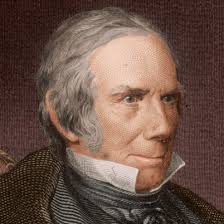
Henry Clay ran thrice for President. Obviously, he lost thrice. This does not diminish the importance of this political figure in American history. Clay was one of the leading senators in American history and together with John C. Calhoun and Daniel Webster, ruled American politics in the early nineteenth century. Webster, Calhoun and Clay were considered the “Great Triumvirate” of the American political realm and indeed, an argument could be made that although none of the three men became President, they exerted more influence on American history than the Presidents of the day.
Clay was born in Virginia in 1777. His father, John Clay, a Baptist minister, died when Henry was only four. Henry’s mother remarried soon afterward. He studied law under the mentoring of George Wythe. In 1797, Clay struck out on his own to practice law. It was at this time, that Clay moved with his family to Kentucky. He grew affluent and influential through his law practice and was elected to the Kentucky legislature in 1803. He was met with great success in the state legislature and was soon appointed to the United States Senate to represent Kentucky. He was also appointed to the Senate in 1810 after returning to the Kentucky legislature for awhile.
In 1811, Clay was elected to the US House of Representatives. He was elected Speaker of the House and appointed his supporters and like-minded friends to important House committees. Clay and his supporters advocated war with Great Britain. They were called “War Hawks”. The work of the War Hawks eventually led to the War of 1812. Clay, a critical figure in the beginning of the war also signed the peace treaty.
Today, Clay is perhaps best known for being one of the founders of the “American System” of economics. He was incredibly supportive of tariffs. Tariffs are taxes on foreign goods to discourage imports and encourage domestic production. In the years following the War of 1812, with the Industrial Revolution on the rise in Great Britain and New England, the United States was competing with its cousins across the Atlantic for business. By imposing tariffs, the United States boosted its own production and economy. Clay was also supportive of better roads and canals. He was also one of the founders of the American Colonization Society, which established Liberia in 1820. (For more information on the ACS and the colonization of West Africa, see my previous post, “Colonists To Colonizers”.)
Clay was foundational in the establishment of the Whig Party, which was the primary rival of the Democratic Party until the 1850s when the Republican Party replaced it. The Whigs were devoted to building a modern economy and maintaining the freedom and liberty of Americans. Henry Clay ran thrice for President. His first loss made him a bitter enemy. He ran against John Quincy Adams and Andrew Jackson. As it became apparent that he would not be able to win himself, Clay transferred his votes and support to Adams. He was appointed Secretary of State by Adams. This led to Jacksonian hatred and the denouncement of the election as a corrupt bargain between Adams and Clay.
Henry Clay died in 1852 but not without leaving his mark on American history. He and his colleagues had built the United States into what we know it as today. The modern economy and industrial power of the United States was initiated by Clay’s “American System” and Clay’s party, the Whigs, co-dominated politics for almost half a century.
Here are some quotes from Henry Clay:
“Government is a trust and the officers of the government are trustees. And both the trust and the trustees are created for the benefit of the people.”
“I would rather be right than be President.”
Interesting Fact of the Week- Unknown to the federal government, Henry Clay was elected to the Senate before he met the age requirement. He himself did not catch the problem until after he had reached the required age and by then it did not matter. Only one other US Senator has faced the same issue. Joe Biden reached the required age before his inauguration but was elected when he was technically “too young”.
Inspiring Quote of the Week- “In the end, it’s not the years in your life that count. It’s the life in your years.” -Abraham Lincoln
